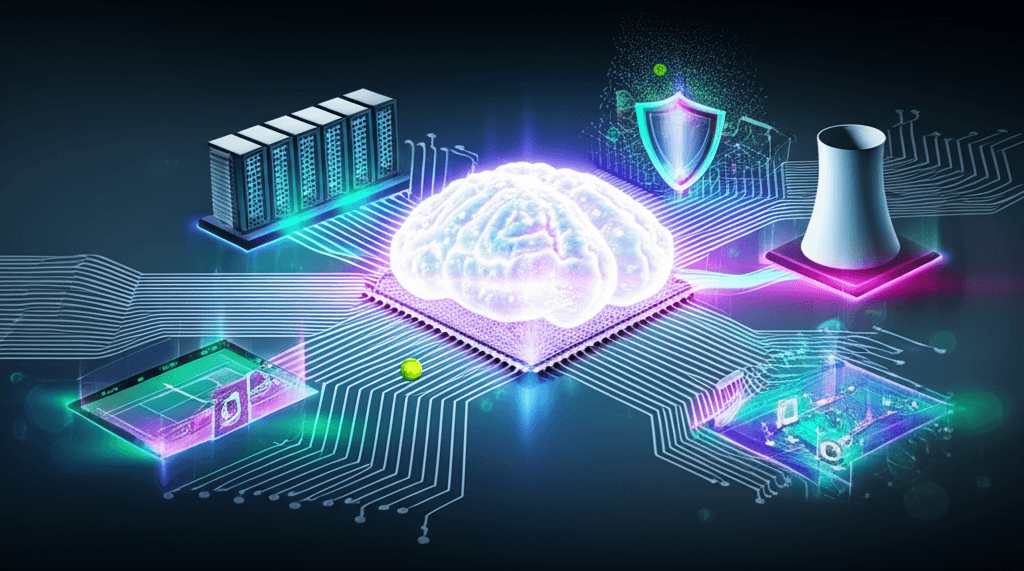AI's Explosive Transformation: Billions Invested, Nuclear Power, Defense Integration
Record investments fuel AI's rapid expansion, reshaping industries from infrastructure and energy to sports and defense.
June 20, 2025

The artificial intelligence sector is undergoing a period of explosive growth and transformation, marked by massive infrastructure investments, novel applications, and a deepening integration with major industries. Recent developments highlight this rapid evolution, as technology giants pour billions into expanding the physical footprint of AI and cloud computing. Amazon has committed to a landmark $10 billion investment to build a new data center campus in North Carolina, aimed at bolstering its AI and cloud capabilities.[1][2][3][4][5][6] In a parallel move to address the immense energy demands of this expansion, Meta has secured a long-term deal to power its AI data centers with nuclear energy.[7][8][9][10][11] The sports world is also seeing new AI integration, with Wimbledon and IBM collaborating to bring enhanced AI-driven features to tennis fans.[12][13][14][15][16] Meanwhile, the increasing strategic importance of AI is underscored by OpenAI's new contract to develop advanced AI for the U.S. Department of Defense.[17][18][19][20][21][22][23][24]
In one of the most significant economic development projects in North Carolina's history, Amazon plans to invest $10 billion to build a campus for cloud computing and artificial intelligence infrastructure.[1][5] The project in Richmond County is expected to create at least 500 direct high-skilled jobs, including engineers and technical specialists, and thousands of additional jobs in construction and the data center supply chain.[1][2][3][4][25] This move is part of Amazon's broader strategy to compete with rivals like Google and Microsoft in the generative AI space, which requires massive computational power and advanced cloud infrastructure.[3] The investment is poised to transform the local economy of Richmond County, a region with a population of about 42,000 that has historically been impacted by the decline of textile manufacturing.[1][25] Beyond the immediate job creation, Amazon is launching a $150,000 community fund and partnering with local colleges and schools to provide workforce training programs for data center and technology careers.[2][4][5][6] This investment builds on Amazon's existing presence in the state, where it has invested $12 billion since 2010.[2][4][5]
The insatiable energy demand of the expanding AI industry is forcing tech giants to seek out powerful and reliable energy sources. Meta has taken a significant step in this direction by signing a 20-year agreement with Constellation Energy to power its Illinois data centers with nuclear energy from the Clinton Clean Energy Center.[7][8][9][10] The deal, which begins in 2027, will supply 1,121 megawatts of emissions-free power, a crucial move as Meta's power consumption saw a 33% increase in 2023 alone.[7][9] The agreement is also credited with preserving over 1,100 local jobs and preventing the premature closure of the nuclear plant.[7][10][11] This turn to nuclear power highlights a broader trend, as the electricity usage by data centers globally is projected to more than double by 2030, with AI being a primary driver.[26][10] While nuclear energy offers a carbon-free, 24/7 power source, challenges related to new construction, waste management, and public perception remain.[26][27]
As AI infrastructure expands, so do its applications. The collaboration between IBM and the All England Lawn Tennis Club is bringing new generative AI features to Wimbledon to enhance the fan experience.[12][13][14][15] A new AI assistant called "Match Chat" will be available on Wimbledon's digital platforms, allowing fans to ask questions about live matches and receive real-time analysis generated by IBM's watsonx platform.[12][13][14][15] This interactive tool is trained on Wimbledon's unique terminology and editorial style to ensure accuracy.[13] IBM is also enhancing its "Likelihood to Win" tool, which provides dynamically updated win probabilities throughout a match.[12][13] This follows previous AI innovations at the tournament, including AI-generated commentary for highlight reels of matches played on courts without human commentators.[28][29][30][31][32] These features aim to make the tournament more accessible and engaging for a global audience that increasingly consumes sports through digital channels.
The strategic implications of artificial intelligence are becoming increasingly clear with OpenAI's new pilot program with the U.S. Department of Defense. The contract, which has a ceiling of $200 million, will see OpenAI develop "prototype frontier AI capabilities" for a range of applications.[17][18][19][20][23] The focus is on transforming administrative operations, improving healthcare for service members, streamlining data analysis for acquisitions, and supporting proactive cyber defense.[19][20][24] The initiative, dubbed "OpenAI for Government," consolidates the company's work with various government agencies, including NASA and the Treasury Department, under a single umbrella.[17][19] This move signifies a notable shift for OpenAI, which had previously restricted military applications of its technology.[33] It also reflects a broader trend of major tech companies increasingly partnering with the military, adapting consumer AI for defense purposes and raising questions about safety, ethics, and oversight in an era of dual-use technologies.[21][33]
In conclusion, the recent flurry of activity in the artificial intelligence sector paints a picture of an industry rapidly scaling its foundational infrastructure, innovating in public-facing applications, and becoming deeply enmeshed in critical areas like national defense. Amazon's massive data center investment in North Carolina signals the physical-world demands of the AI boom, while Meta's turn to nuclear power underscores the immense energy challenge that comes with it. At the same time, the Wimbledon-IBM partnership demonstrates how AI can be harnessed to enrich cultural and entertainment experiences. Finally, OpenAI's defense contract highlights the technology's growing strategic importance and the complex ethical landscapes that companies must navigate. Together, these developments illustrate a pivotal moment for AI, as its expansion drives major economic shifts, reshapes industries, and poses new societal questions.
Sources
[1]
[4]
[11]
[13]
[14]
[16]
[18]
[19]
[20]
[22]
[24]
[25]
[26]
[27]
[29]
[30]
[31]
[32]
[33]